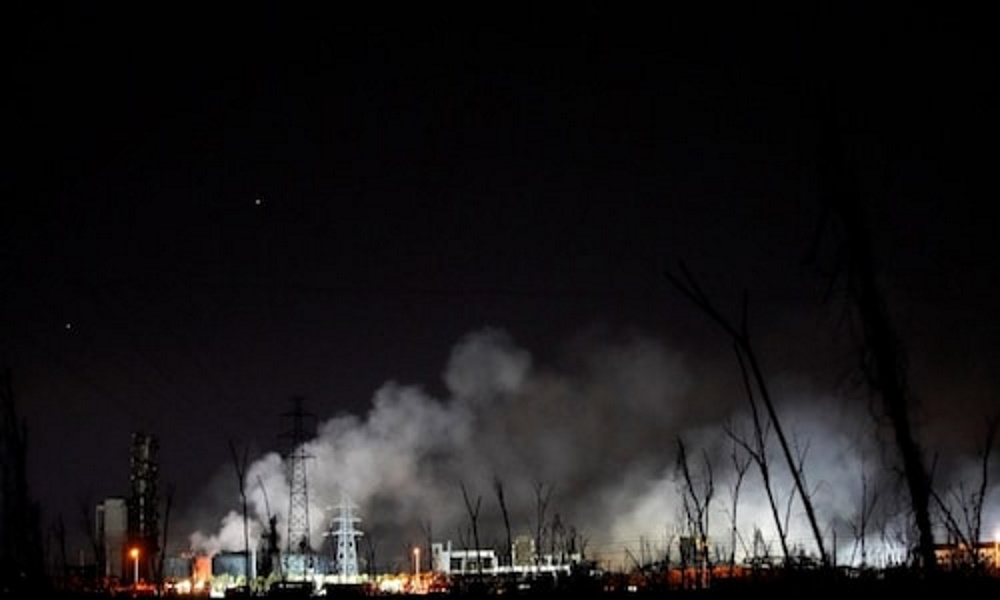Trump voters in storm-ravaged Texas county confront global warming
By Claire Galofaro
16 October 2017
PORT ARTHUR, Texas (Associated Press) – The church was empty, except for the piano too heavy for one man to move. It had been 21 days since the greatest storm Wayne Christopher had ever seen dumped a year’s worth of rain on his town, drowning this church where he was baptized, met his high school sweetheart and later married her.
He had piled the ruined pews out on the curb, next to water-logged hymnals and molding Sunday school lesson plans and chunks of drywall that used to be a mural of Noah’s Ark. Now he tilted his head up to take in the mountain of rubble, and Christopher, an evangelical Christian and a conservative Republican, considered what caused this destruction: that the violent act of nature had been made worse by acts of man.
“I think the Lord put us over the care of his creation, and when we pollute like we do, destroy the land, there’s consequences to that,” he said. “It might not catch up with us just right now, but it’s gonna catch up. Like a wound that needs to be healed.”Jefferson County, Texas, is among the low-lying coastal areas of America that could lose the most as the ice caps melt and the seas warm and rise. At the same time, it is more economically dependent on the petroleum industry and its emissions-spewing refineries than any other place in the U.S. Residents seemed to choose between the two last November, abandoning a four-decade-old pattern of voting Democratic in presidential elections to support Donald Trump.Then came Hurricane Harvey. Now some conservatives here are newly confronting some of the most polarizing questions in American political discourse: What role do humans play in global warming and the worsening of storms like Harvey? And what should they expect their leaders — including the climate-skeptic president they helped elect — to do about the problem now? […]Christopher, like most people in Jefferson County, believed that global warming was real before the storm hit. Post-Harvey, surrounded by debris stretching for block after block, he thinks the president’s outright rejection of the scientific consensus is no longer good enough. […]As a private citizen and candidate, Trump often referred to climate change as a hoax, and since taking office he and his administration have worked aggressively to undo policies designed to mitigate the damage. He announced his intention to pull out of the Paris climate agreement, a global accord of 195 nations to reduce carbon emissions, and his administration has dismantled environmental regulations and erased climate change data from government websites. This month, his Environmental Protection Agency administrator promised to kill an effort to limit carbon emissions from coal-fired plants. […]When Wayne Christopher was a boy in Jefferson County, it got so hot he remembers frying eggs on the sidewalk. It has always been hot here, and there have always been hurricanes.But it seems to him that something is different now. There is a palpable intensity in the air, in the haze that hangs over the interstate. The region has warmed about two degrees in his lifetime, according to the National Oceanic and Atmospheric Administration, and annual rainfall has increased by about 7 inches on average. Christopher counts the number of times a beach road he’s driven on all his life has had to be rebuilt because the ocean overtook it.“The sea keeps moving in — water rising, land disappearing or eroding or whatever you want to call it — it’s happening,” said Christopher, who is 66 now and retired after toiling more than 40 years for the railroad. “I think Mother Nature can come back, but there’s a point to where, if we just keep on and keep on, I don’t know if she can come back.”He thinks the president he helped put in office should do something: take the threat seriously, research before he talks or tweets, not dismiss established science as a hoax because acknowledging it’s real would mean acknowledging that something must be done.But like many others here, Christopher is not pushing to stick with the Paris climate agreement or other global coalitions because he’s not sure it’s fair that the United States should invest in clean energy when other countries that pollute might not. He worries that could cause more job losses to overseas factories, put a squeeze on the middle class and forfeit a slice of American sovereignty.His wife, who also supported Trump, cocked her head as she thought about that sentiment.“I can see the pros, I can see the cons,” Polly Christopher said. “But if you were to simplify it to your children, and they say, ‘Well, everybody else is doing it, if I do it what difference is it going to make?’ you would just get on them and say, ‘You’ve got to do the right thing. Right is right, and wrong’s wrong.’” [more]
Trump voters in storm-ravaged county confront climate change

“I think the Lord put us over the care of his creation, and when we pollute like we do, destroy the land, there’s consequences to that.” "God" also "created" volcanos and earthquakes.